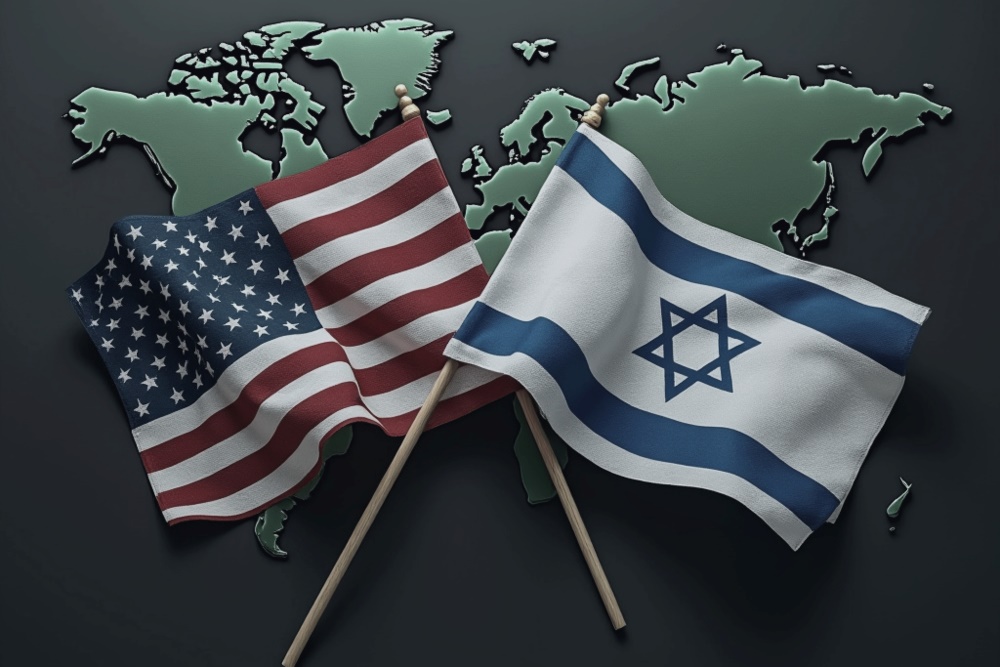
As US-Israel relations become more complex and unstable, Israel finds itself at a strategic crossroads. On one hand, its alliance with Washington is irreplaceable in terms of the power and support it provides. On the other hand, the future of the relationship appears less certain as America’s global position and domestic politics evolve.
The strategic partnership with the US has been a cornerstone of Israeli security and prosperity for decades, offering profound benefits:
Military Support: The US provides Israel with advanced military tech and billions in annual defense aid, ensuring Israel’s qualitative military edge in the region. The US has also mobilized military assets to project power, deter regional rivals and defend Israel’s home front, as was the case in thwarting the Iranian assault in April 2024.
Diplomatic Shield: The US has consistently backed Israel on the international stage. America uses its global influence to shield Israel from unfavorable UN resolutions and to advance peace agreements. US clout and diplomatic support has been critical in securing Israel’s global position, often acting as a buffer against international criticism.
Economic Ties: The US is Israel’s largest trading partner and American companies are major investors in Israel’s high-tech sector. The two countries also collaborate extensively on innovation and defense technology. This partnership has fostered an environment where Israeli startups can thrive, leveraging US investment and market access to scale globally.
No other global power can match this level of comprehensive support, making the US alliance crucial for Israel’s development and success.
American era of change
Despite the alliance’s strength, several factors contribute to uncertainty about its future:
Shifting US Priorities: America’s strategic focus is increasingly shifting towards the Indo-Pacific and countering China. This pivot to Asia signals a potential reduction in US attention and resources devoted to the Middle East.
Furthermore, the evolving US energy landscape and shift to energy independence reduce its reliance on Mideast oil, further diminishing US interest in the region and potentially in Israel.
All of these trends, coupled with growing isolationist sentiments in the US, could significantly reshape the dynamics of US-Israel relations.
Diverging Strategic Interests: As geopolitical dynamics evolve, US and Israeli interests may not always align, particularly regarding Iran and the Palestinian issue. The rise of other powers like China and India presents both challenges and opportunities for Israel’s strategic position and ties with Washington.
Domestic Political Changes: Growing partisan divides and generational shifts in the US could affect long-term support for Israel. Overall, American commitment to the alliance is still robust. However, it could become more conditional, subject to the changing tides of US domestic politics.
Israel is acutely aware of all these uncertainties and has been exploring ways to reduce its dependence on US support. However, the strategic dilemma remains: Israel needs to find ways to diversify its global partnerships and enhance its autonomy while keeping a strong relationship with America, whose support remains vital.
Israel’s options: New alliances?
Israel is exploring different avenues as it seeks to decrease its reliance on American backing and goodwill. These steps include the following:
Strengthen Ties With World Powers: While maintaining the US as its primary ally, Israel will likely aim to cultivate deeper ties with other powers. This includes expanding defense and tech cooperation with India, a rising global power with substantial shared interests.
Another path is to cautiously engage with China, while being mindful of US concerns. Notably, Israel’s ties with Beijing have deteriorated after some promising years.
Diversify Partnerships: Jerusalem is also working to expand security and economic cooperation with smaller states that can offer promising rewards. For example, Israel reportedly increased arms acquisitions from Serbia during the Gaza war to counter quiet boycotts by other partners.
In parallel, Israel is expanding its diplomatic outreach beyond traditional security realms. In particular, Jerusalem is leveraging its technological power and innovation to address global challenges in areas like agricultural and water scarcity, enhancing its soft power and global reach.
Regional Integration: Leveraging the Abraham Accords, Israel could deepen ties with Arab states, potentially reducing its reliance on US mediation and presenting itself as a stabilizing regional power.
Especially in the face of the Iranian threat, Israeli willingness to aggressively counter Tehran could help in forging a close regional network. This alliance may be less attuned to US directives, or alternately, work more effectively to elicit greater cooperation from Washington.
Strategic Israeli shifts
Israel can also make some strategic decisions that will change the dynamics of its ties with Washington in some key areas:
Strategic Autonomy: Israel is starting to develop independent capabilities to reduce vulnerability to potential shifts in US support. Plans to boost local production of critical munitions and military gear are already underway, but it will take years before the IDF can rely on these homemade arms.
Still, Israel will need to closely coordinate such plans with the US, given the intimate ties with America’s military industry and defense establishment. In any case, Israel’s strategic reliance on US weapons is expected to continue for the foreseeable future.
Enhance Value to US Strategy: Israel could further leverage its strengths in areas like cybersecurity, counter-terrorism and technological innovation to position itself as an indispensable US partner. Moreover, Jerusalem could shift some of its policies to align more strongly with broader US interests beyond the Middle East, such as Ukraine.
Israel can also aim to minimize areas of controversy, for example by working with Washington to reduce US aid. Doing this will also reduce American leverage on Israeli decision-making. However, such steps should be weighed and implemented carefully and in close collaboration.
Balancing act in changing world
In the bottom line, Israel faces a critical strategic dilemma: Israeli reliance on US military, diplomatic and economic support remains unparalleled. But the unpredictability of US foreign policy, combined with the shifting global power structure, compels Israel to seek new alliances and enhance its strategic autonomy.
This balancing act requires Jerusalem to tread carefully, ensuring that its turn to new directions does not undermine Israel’s most important relationship.
Looking ahead, several scenarios could unfold. Israel may deepen its ties with emerging powers and other global players and enhance its strategic flexibility. However, this could strain ties with the US if these partnerships conflict with American interests.
Alternatively, the US might recalibrate its Mideast strategy in a way that reinforces its commitment to Israel, but with new conditions attached. It is also possible that unexpected developments will push US-Israel relations to entirely new directions in the longer term.
One way or another, Israel’s challenge will be to navigate the changing dynamics without compromising its core security interests, while coping with escalating regional threats.


